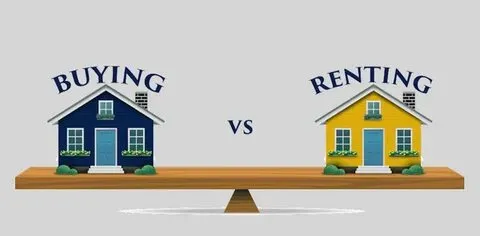- +91- 9899012036
- info@bsinfra.in

In the journey toward establishing a stable and secure living situation, one of the most critical decisions individuals face is whether to buying vs renting a home. The choice between homeownership and renting is a multifaceted decision that involves financial considerations, lifestyle preferences, and long-term goals. In this comprehensive exploration, we will delve into the pros and cons of buying and renting a home, helping you make an informed decision that aligns with your vision for the future.

Prosperity Accumulation: Homeownership allows you to build equity over time as you pay off your mortgage. This equity can serve as a valuable asset and contribute to your long-term financial well-being.
Personalization: Owning a home gives you the freedom to personalize and modify your living space according to your preferences. You have control over renovations, decorations, and landscaping.
Property Appreciation: Real estate has the potential to appreciate over the years, providing homeowners with an opportunity for a profitable return on investment when selling.
Fixed Mortgage Payments: With a fixed-rate mortgage, your monthly payments remain stable over the life of the loan, offering predictability and budgetary stability.
Initial Costs: Buying a home involves significant upfront costs, including a down payment, closing costs, and potential maintenance expenses.
Property Value Risk: Real estate markets can be subject to fluctuations, and economic downturns may impact the value of your property.
Property Upkeep: Homeowners are responsible for the maintenance and repairs of their property, incurring additional costs and time commitments.
Mobility Restrictions: Homeownership can limit your flexibility to move quickly, especially if you need to relocate for a job or personal reasons.
Lower Initial Costs: Renting typically involves lower upfront costs, with no need for a substantial down payment or maintenance expenses.
Easier Relocation: Renting provides greater flexibility, allowing you to relocate more easily without the burden of selling a property.
Limited Maintenance: Renters are generally not responsible for major maintenance and repair costs, as these are typically handled by the landlord.
Investment Allocation: Renting allows you to allocate your funds to other investments or financial goals, providing a diversified approach to wealth-building.
Missed Investment Opportunities: Renting does not offer the same wealth-building opportunities as homeownership through equity accumulation.
Potential for Higher Costs: Rent prices can increase over time, impacting your monthly budget and potentially making it more challenging to save.
Restrictions on Modifications: Renters often have limited freedom to personalize or modify their living spaces according to their preferences.
Lease Restrictions: Renting comes with the uncertainty of lease renewals, and landlords may impose restrictions on activities or pets.
When deciding between buying vs renting a home, there is no one-size-fits-all answer. The decision is deeply personal and depends on your unique circumstances, financial situation, and long-term goals. Here are some factors to consider:
Evaluate your financial readiness for homeownership, considering factors such as your credit score, savings for a down payment, and ability to handle ongoing expenses.
Consider your lifestyle preferences and how they align with homeownership or renting. Do you value stability and long-term commitment, or do you prioritize flexibility and mobility?
Market Conditions:
Research current real estate market conditions in your desired location. Understanding property values, trends, and economic indicators can provide valuable insights.
Clarify your long-term goals. If you envision settling in one place for an extended period and building equity, homeownership might be preferable. If flexibility and mobility are priorities, renting may be the better fit.
Consider your overall financial and investment strategy. If you have alternative investment opportunities or financial goals that align with renting, this may influence your decision.
Assess your risk tolerance. Homeownership involves a degree of financial risk and market exposure, while renting provides a more stable and predictable financial commitment.
In the eternal debate of buying vs renting a home, there is no definitive answer. The decision hinges on your unique circumstances, aspirations, and priorities. Whether you choose the path of homeownership or opt for the flexibility of renting, what matters most is aligning your housing choice with your vision for the future. By weighing the pros and cons, understanding your financial landscape, and considering your lifestyle preferences, you can embark on the journey toward a home that not only shelters you but also nurtures your aspirations for the future.